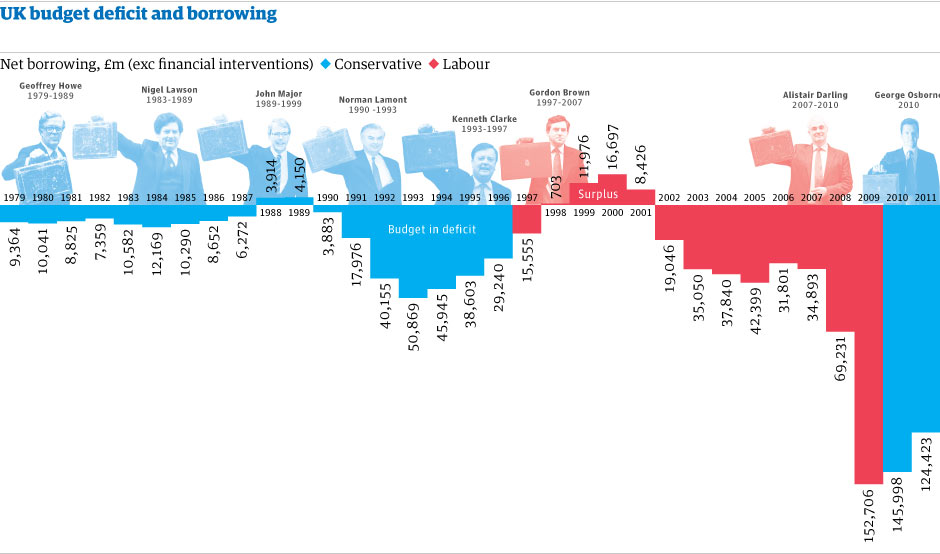On the day the Nobel prize for economics was announced in Stockholm, a former winner was in London urging the government to ditch the "mad" austerity policy that was keeping the British economy depressed. Paul Krugman joined Jonathan Portes for a debate on whether the government had gone too far, too fast.In what world is the current level of government spending 'austerity'? It is the oddest idea that can be imagined. The deficit is huge (from the Guardian):

Apparently this is 'austerity'. Or at least according to the ever more unreal Prof. Krugman this is 'austerity'. Nevertheless, his words will be taken seriously by many. He may have won a nobel prize, but that does not make his pronouncements any more sensible than any other of the many economists that failed to recognise the problems in the world economy until they were already in plain sight.

Austerity - fiscal contraction - can come in degrees. It doesn't have to be as sharp as Ireland or Latvia to also count as austerity.
ReplyDeleteIronically, your graph proves exactly the opposite of your argument: it shows a falling deficit as the Tory cuts to proposed spending and tax increases took effect.
At a time when the UK is weak, tax increases and spending cuts are without doubt "austerity."
And it is perfectly possible to have fiscal contraction with a budget deficit - witness Ireland and Greece.
The chart shows a tiny contraction from massive spending; your comment I think shows any spin can be put on any figures. The reason why I used this particular chart is that it shows that the deficit in the context of the past can hardly be called austerity. However, in any case, borrowing and spending does not really seem like austerity from any point of view, does it? Borrow and spend is, in all cases, hardly austere?
Deletehttp://dictionary.reference.com/browse/austere?s=t
(1) "The chart shows a tiny contraction from massive spending"
DeleteAnd owing to the multiplier effect even small or moderate fiscal contraction can have serious macroeconomic effects, especially when the economy is weak. Having complained at length on this blog about how the multiplier effect increases GDP, you are now apparently unable to see the reverse effect.
(2) "The reason why I used this particular chart is that it shows that the deficit in the context of the past can hardly be called austerity."
First, why did the deficits soar in 2009 and 2010? It was mainly because tax revenues collapsed in an unprecedented manner, not because of massive increases in spending. Brown went for a Keynesian stimulus of course, but that wasn't why the deficit increased so much.
Secondly, in the past, the UK economy was in a different, better state. It wasn't, as it is now, in the aftermath of the greatest financial crisis in modern history and worst global post-WWII recession ever seen, and on life support. Therefore the deficit in the "context of the past" is not very meaningful, without looking at the actual state of the economy now as compared with the past.
(3) "borrowing and spending does not really seem like austerity from any point of view, does it"
On the contrary, it is perfectly possible to have fiscal contraction ("austerity") along with a budget deficit. Fiscal contraction can still occur with a deficit by simply raising taxes, cutting spending or even keeping spending roughly level.
E.g., Greece has a budget deficit: does anyone seriously think that Greece hasn't pursued austerity?
I hold no brief for Prof Krugman, but I guess his argument would be that:
ReplyDelete* letting automatic stabilisers work automatically in a recession (i.e. maintaining discretionary spend even as revenue collapses and demand-led spend rises) equals neutrality even tho' it raises the deficit;
* increasing discretionary spend in a recession to exaggerate the effect of the stabilisers is Keynesian (and presumably his preference); and
* cutting discretionary spend in a recession, even if you cut it by less than the rise in demand-led spend, is austerity.
Not saying he's right, but I imagine that's what he means by the term.